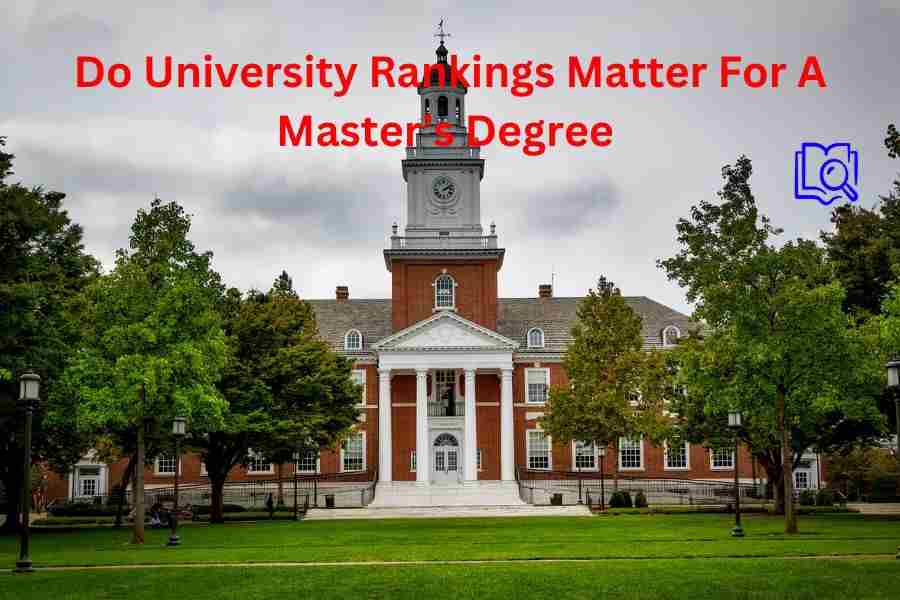Last updated on December 4th, 2025 at 06:46 am
Master’s degrees require investments of time and money, so deciding whether to pursue a master’s degree will be a personal one. The question “Is a master’s degree worth it?” is more relevant than ever if you intend to pursue a PhD and if it’s advisable to get a PhD without a master’s.
This in-depth article investigates the value and challenges of a few master’s programs with relevant statistics and insights to help you make an informed decision about whether or not it makes sense to get a master’s degree.
Table of Contents
Financial Aspects
- Tuition and Associated Costs: Master’s programs require significant financial investments. Tuition costs vary widely by institution and country.
In the U.S., for instance, annual tuition can range from $30,000 to $40,000. This is a considerable expense that prospective students must weigh carefully.
- Scholarships, Grants, and Financial Aid: Many institutions offer scholarships, grants, and assistantships. Government and private organizations also provide financial aid. It will help to identify these sources, for they can significantly reduce the financial burden and make a master’s more accessible.
Return on Investment (ROI) Analysis: Taking time to calculate the ROI involves comparing the cost of the degree with potential lifetime earnings; this analysis will help in making a reasonable investment.
Career Advancement Statistics
- Increased Earning Potential: Statistically, individuals with master’s degrees earn more than those with only bachelor’s degrees. This increased earning potential makes the investment in a master’s degree worthwhile. The following statistics illustrate the difference master’s degrees have over bachelor’s degrees in terms of annual earnings:
The National Center for Education Statistics reports that median annual earnings for master’s degree holders are about $12,000 higher than those with bachelor’s degrees.
Likewise, the National Association of Colleges and Employers (NACE) reports that the median starting salary for master’s degree holders is about 20% higher than for those with bachelor’s degrees.
Table 1: Education Level and Average Salary
Education Level | Average Annual Salary (USD) |
|---|---|
Bachelor’s Degree | $65,000 |
Master’s Degree | $80,000 |
Professional Degree | $95, 000 |
To further illustrate the financial benefits of a master’s degree, let’s compare average salaries in a few key fields.
Table: Average Salaries by Field
Field | Bachelor’s Degree Annual Salary (USD) | Master’s Degree Annual Salary (USD) |
|---|---|---|
Education | $50,000 | $60,000 |
Engineering | $70,000 | $85,000 |
Business Management | $65,000 | $80,000 |
Healthcare | $60,000 | $75,000 |
- Job Security and Stability: A master’s degree can offer greater job security. In competitive fields, advanced education can be a differentiator. Employers often view a master’s degree as a commitment to your field and an indication of your ability to handle complex tasks.
- Opportunities for Leadership Roles: Leadership and management positions often require or prefer candidates with advanced degrees. Fields such as business, education, and healthcare particularly value advanced degrees for leadership roles.
Personal and Professional Growth
- Skill Enhancement and Specialization: Master’s programs offer specialized training that enhances expertise and practical skills. This specialized knowledge is a significant asset in the job market.
- Networking Opportunities: Graduate programs provide excellent networking platforms. Connections with peers, faculty, and industry professionals can lead to job opportunities, collaborations, and professional growth by making your presence known.
- Personal Fulfillment and Achievement: For many, pursuing a master’s degree is also about personal fulfillment. Reflect on your reasons for wanting to do a master’s. The challenge of advanced study and the achievement of earning a degree can be deeply satisfying. It develops a lifelong love of learning and intellectual curiosity.
Time Commitment
- Full-Time vs. Part-Time Master’s Programs: Full-time programs typically take one to two years to complete, while part-time programs can extend to three or more years. The choice depends on your personal and professional circumstances.
- Balancing Work, Study, and Personal Life: Balancing work and study can be challenging. Many students work part-time or full-time while pursuing their degree, requiring strong time management and organizational skills. You can consider taking online and evening classes, which provide flexibility for working professionals.
Alternatives to a Master’s Degree
- Professional Certifications: Professional certifications in fields such as IT, project management, and healthcare can enhance skills and employability without the time and financial commitment of a full degree.
- Online Courses and MOOCs: MOOCs and online courses from platforms like edX offer flexible and often cost-effective ways to gain new skills and knowledge. These courses can be a good way to explore new fields or supplement existing expertise.
- Short-term training programs: There are several intensive training programs, or boot camps, that provide quick, focused education on specific skills. They are trendy in tech fields and can be an effective alternative to a master’s degree.
Field-Specific Benefits
- STEM vs. Non-STEM Degrees: The impact of a master’s degree varies by field. STEM fields generally offer higher returns on investment compared to non-STEM fields, with advanced degrees in STEM often associated with higher salaries and greater job security.
- Industry-Specific Advantages: Certain industries value master’s degrees more than others. For example, advanced degrees are often essential in academia, research, and healthcare, whereas fields like entrepreneurship may place more value on experience and innovation.
- High-Demand Fields Requiring Advanced Degrees: Fields such as data science, healthcare administration, and cybersecurity have a high demand for master’s degree holders due to the specialized skills required.
Global Perspective
- International Recognition of Degrees: Master’s degrees from well-regarded institutions are recognized internationally and can enhance career prospects globally. This recognition is valuable for those planning to work abroad or for multinational companies.
- Study Abroad Opportunities: Pursuing a master’s degree abroad offers additional benefits like exposure to new cultures, languages, and international networks. Countries like the USA, UK, Canada, and Australia are popular destinations for international students seeking high-quality education.
- Comparing Education Systems Globally: Understanding the differences in education systems globally can help in choosing where to pursue a master’s degree. Factors like curriculum structure, teaching methods, and industry connections vary and can impact the overall educational experience.
Costs Beyond Tuition
- Living Expenses and Relocation Costs: Living expenses, including housing, food, and transportation, add to the overall cost of a master’s degree. Relocating to a different city or country can further increase these costs.
- Opportunity Costs of Full-Time Study: Full-time study often means foregoing full-time employment, resulting in lost income. This opportunity cost should be considered when evaluating the financial feasibility of pursuing a master’s degree.
- Hidden Costs (Books, Supplies, and Technology): Additional expenses such as books, supplies, and technology need to be factored into the total cost of a master’s degree. These hidden costs can add up and should be planned for in advance.
Job Market Analysis
- Current Trends in Employment: Understanding current job market trends can help in assessing the value of a master’s degree. Fields with high growth potential may offer better returns on investment for advanced degrees.
- Industries with High Demand for Master’s Graduates: Industries such as healthcare, technology, and education have a high demand for master’s graduates. These sectors often offer better job prospects and higher salaries for individuals with advanced degrees.
- Long-Term Career Outlook: Considering the long-term career outlook in your chosen field is crucial. Fields that are projected to have a high demand for the future may offer more opportunities and stability for master’s degree holders.
Employer Expectations
- Employer Preferences for Advanced Degrees: Many employers prefer or require advanced or rated among the hardest master’s programs for certain positions. Understanding these preferences can help in deciding whether a master’s degree is necessary.
- Impact on Hiring and Promotions: Employers often prioritize candidates with advanced degrees for higher-level positions. This can impact hiring decisions and promotional opportunities, making a master’s degree a valuable asset in the job market.
- Real-World Case Studies: Examining real-world case studies of professionals who have pursued master’s degrees can provide insights into the tangible benefits and challenges. These case studies often highlight the diverse career trajectories and successes of degree holders.
Technological Impact
- The Role of Technology in Education: Technology has revolutionized education, making it more accessible and flexible. Online learning platforms and virtual classrooms have expanded the reach of master’s programs, allowing students to learn from anywhere in the world.
- Online vs. Traditional Classroom Experience: Online master’s programs offer flexibility and convenience, while traditional classroom settings provide direct interaction with faculty and peers. Each mode has its advantages, and the choice depends on individual learning preferences and circumstances.
- Future Trends in Higher Education: The future of higher education is likely to see more integration of technology, personalized learning experiences, and increased collaboration between institutions and industries. These trends will shape the landscape of master’s programs in the coming years.
Real-Life Stories
- Testimonials from Master’s Degree Holders: Hearing from individuals who have completed master’s programs can provide valuable perspectives on the benefits and challenges. Testimonials can highlight personal growth, career advancement, and the impact of the degree on their lives.
- Success Stories and Lessons Learned: Success stories often highlight the transformative power of a master’s degree. They provide inspiration and practical lessons for prospective students, illustrating how advanced education can open doors to new opportunities.
- Challenges Faced During and After Degree Completion: Understanding the challenges faced by Master’s graduates, such as managing workload, financial stress, and job market competition, can help prospective students prepare for and navigate their educational journeys.
Assessing Your Readiness
- Self-Evaluation Questions: Prospective students should ask themselves specific questions to assess their readiness for a master’s program. Questions about career goals, financial capacity, and personal commitment are essential for making an informed decision.
- Financial and Emotional Readiness: Financial and emotional readiness are decisive for the successful completion of a master’s degree. Prospective students need to evaluate their ability to manage the financial burden and the emotional challenges of rigorous academic study.
- Support Systems and Resources: Having a strong support system, including family, friends, and mentors, can make a significant difference in exploring the challenges of a master’s program. Utilizing available resources, such as academic advisors and career services, is also important.
Long-Term Benefits
- Lifelong Learning and Adaptability: A master’s degree can cultivate a culture of lifelong learning and adaptability. The advanced skills and knowledge gained can help individuals stay relevant and competitive in a rapidly changing job market.
- Impact on Personal Life and Relationships: Pursuing a master’s degree can have a deep impact on personal life and relationships. It can lead to personal growth, increased confidence, and a sense of accomplishment that positively influences various aspects of life.
- Legacy and Influence on Future Generations: Achieving a master’s degree can inspire future generations to pursue higher education. It sets a precedent for academic excellence and lifelong learning within families and communities.
Risks and Downsides
- Potential Financial Burdens: One of the significant risks of pursuing a master’s degree is the potential financial burden. The cost of tuition, living expenses, and lost income during study can lead to substantial debt.
- Stress and Burnout: The demanding nature of master’s programs can lead to stress and burnout. Balancing academic workload with personal and professional responsibilities requires strong time management and self-care strategies.
- Overqualification in Some Fields: In some fields, a master’s degree may lead to overqualification, making it challenging to find suitable job opportunities. This risk underscores the importance of carefully considering the relevance of the degree to one’s career goals.
The Decision-Making Process
- Step-by-Step Guide to Making the Decision: A structured decision-making process can help prospective students evaluate whether applying for a master’s degree is the right choice. This includes researching programs, assessing financial feasibility, and considering long-term career goals.
- Consulting Mentors and Advisors: Seeking advice from mentors and academic advisors can provide valuable insights and guidance. These individuals can offer personalized advice based on their experience and knowledge of the field.
- Utilizing Career Services and Resources: Many institutions offer career services and resources to help students make informed decisions. These services can include career counseling, job placement assistance, and workshops on resume writing and interview skills.
Future of Master’s Degrees
- Trends and Predictions: The future of master’s degrees is likely to see continued growth in online and hybrid programs, increased emphasis on interdisciplinary studies, and greater collaboration with industry partners. These trends will shape the evolution of advanced education.
- Changes in Curriculum and Delivery: Curriculums are becoming more flexible and innovative, incorporating new teaching methods and technologies. This evolution aims to enhance the learning experience and better prepare students for the demands of the modern workforce.
- Evolving Employer Requirements: As industries evolve, so do employer requirements. Master’s programs are adapting to these changes by offering specialized tracks and practical training that align with the needs of employers.
So, is a master’s degree worth it?
- Common Questions and Concerns: Addressing common questions and concerns can help prospective students make informed decisions. Topics such as program length, cost, and career prospects are frequently discussed.
- Misconceptions about Master’s Degrees: Dispelling misconceptions about master’s degrees is important. For example, some people believe that a master’s degree guarantees a high-paying job, which is not always the case. Clarifying these points can set realistic expectations.
- Tips for Prospective Students: Offering practical tips for prospective students, such as how to choose the right program, manage finances, and balance responsibilities, can provide valuable guidance.
- Summarizing the Pros and Cons: Summarizing the pros and cons of pursuing a master’s degree can help prospective students weigh their options. Highlighting key points about financial investment, career benefits, and personal growth provides a comprehensive overview.
FAQs
What are the disadvantages of getting a master’s degree?
The major disadvantages are the cost and financial commitments. Tuition fees, living expenses, and day-to-day expenses can lead to student debt and must be considered. It will help to weigh the pros and cons before committing to a master’s program.
What is the best age for a Masters?
Most students apply for a master’s in their late 20s or early 30s. However, one can opt for a master’s at any age, even if you’re in your 40s, 50s, 60s, or more.
How long is a master’s degree?
Generally, a master’s takes 18 months to two years to complete; however, other factors can increase the timeframe. It will be safe to assume a period of two to three years.
Final Thoughts
Concluding with final thoughts on the value of a master’s degree, emphasizing that the decision is highly subjective and depends on personal goals, financial capacity, and career aspirations. Ultimately, the worth of a master’s degree is determined by how well it aligns with one’s professional and personal objectives.
Hopefully, this article will help you decide whether or not to engage with a Master’s program.




